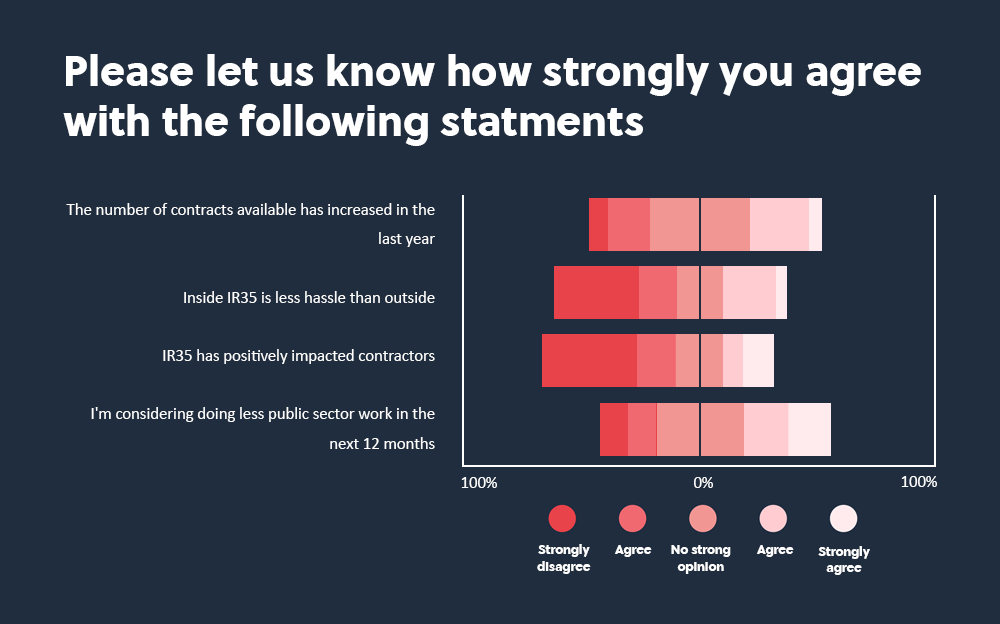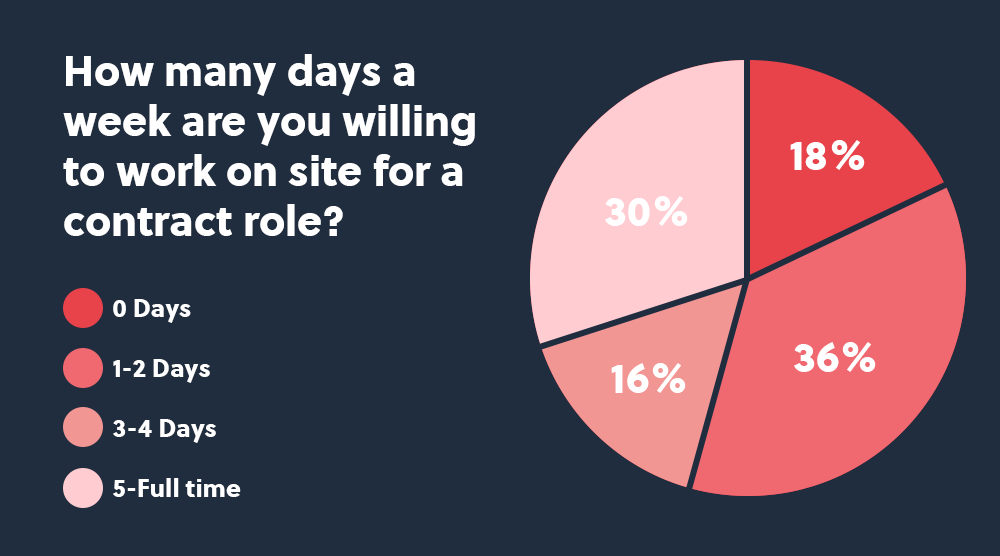In order to get a clear picture of the state of the sector for contract workers, we surveyed our workforce to gain their perspectives and experiences working on contract projects, whether within the public or private sector. The responses were from a mixture of those who had been working on contracts for between 0-2 years, 2-5 years, and 5 or more years.
IR35
Of the contractors we surveyed, the majority strongly disagreed that working inside IR35 was less hassle than outside, and equally strongly disagreed that IR35 has positively impacted contractors. When you consider these responses within the context of the political and financial events towards the latter end of the year, the attitudes expressed towards IR35 legislation are unsurprising, with the vast majority of our respondents highlighting the ongoing impact of the legislation on contract work. Whilst some contractors working within the private sector are happy to accept a contract that falls outside IR35 for a lower day rate, for public sector contractors the effects of IR35 have been felt more prominently. More than this, though, the majority of the contractors surveyed seem to be considering doing less public sector work in the next 12 months, which tracks a shift towards the popularity of contracts within the private sector.

Benefits
When asked about the benefits of working within the public sector as opposed to the private sector, many of the responses we received centred around the quality of work on public sector contracts, and the ability to have a significant impact and give back to society, which in turn leads to higher job satisfaction. Equally, many noted the flexibility available as a significant benefit, with the ability to adapt working hours to fit around home life and commitments. One contractor noted that, when working within the public sector, you are ‘not expected to work longer hours than government employees, so work-life balance is good.’ Others also noted that the work itself is interesting and enjoyable, with less pressure from end users, and well-documented processes. The contracts tend to be long-term, with a diverse range of opportunities and a ‘focus on the job rather than office politics.’
One of our responders noted that the ‘competency and skill seems to be higher’ in the private sector. This could potentially be accounted for by the nature of public sector contracts versus private: where the public sector has allocated budgets to utilise for contractor projects, there is a lot more pressure on private sector businesses to employ contractors that can get the work done efficiently and effectively and ensure they are worth the fee paid. This feeds into the general consensus that, although the day rates for public sector contracts may be comparatively lower, there is better work-life balance as opposed to the high-paid but high-pressure nature of private sector contracting.
Challenges
Conversely though, when asked about the challenges- either future or current- of working on contracts, many of the respondents noted concerns about a decrease in work and lower day rates within the public sector. One noted there seems to be a general ‘lack of clarity’, with ‘budgets falling short of what is needed to do the job properly’ at times. Some have also expressed concerns about instability within the government affecting the stability of contracts and, equally, the tenuous financial climate appears to be leading to anxiety around committing to projects for private sector contractors.

Equally, applicable to both public and private sector contracts are increasing concerns around global warming and carbon footprints relating to contracts which were noted in response to our survey. Anecdotally, there are occasions when contractors have reported attending the site in person for a meeting, only to find that other attendees have logged in remotely, which has caused frustration. As we as a society all become increasingly environmentally conscious, we are all looking for ways to reduce our impact on the planet. As a result of this, we have noticed a shift whereby clients have started to offer remote positions with some ad hoc travel where necessary, as opposed to strictly hybrid or remote contracts, in order to accommodate the changing landscape of work, travel, and tangible environmental impact.
Moreover, a number of respondents to our survey noted that the stringent need for certain levels of clearance was proving to be a blocker to contracts within the public sector. Many potential contractors have all the required skills and experience to fulfil the role but are unable to be taken on due to their level of clearance. As a result of this stumbling block, we have begun to see a trend of clients becoming more accommodating in sponsoring contractors to go through SC clearance, and this is a trend we hope to see continuing into the year ahead.